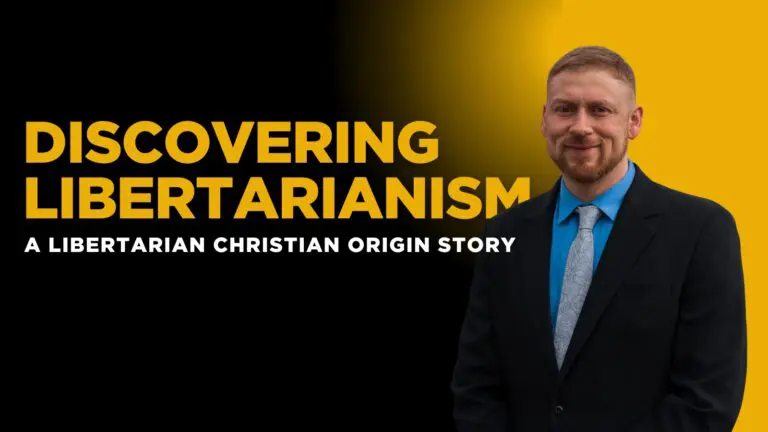
Not everyone is born a libertarian, and even those who were must come to it on their own terms. We believe in the importance of hearing the stories of others, including what they wrestled with, what they rejected, what they embraced, and how their journey led them to where they are today. We know these stories are important to share, not because each of us is a hero, but because heroism is found in all efforts of any size to pursue a Christian ethos and embrace a way of life that enables and encourages flourishing. We offer you these stories as an encouragement and inspiration to help you bolster your faith in the Lord and your belief in human freedom.
As a Christian who was raised in theologically and politically conservative contexts, who is now an academic, I have many friends and colleagues on both the political right and the political left (and everywhere in between). Being a libertarian has meant that I never quite fit with any group. But it has also compelled me to talk to people who don’t already agree with me, which I think has made me not only a better advocate for liberty among fellow Christians, but also a more faithful advocate for the gospel of Christ among those who don’t yet believe in Him.
In some ways, my upbringing primed me to gravitate toward contrarian, anti-establishment views. I was homeschooled, but not in an insular fashion as some are. My parents enjoy culture and learning—my father is from New York City, and my mother from southern California. They encouraged me and my siblings to read and think independently. They are both politically conservative, but not very politically active. As I started to care more about politics and discovered the term “libertarian,” I realized that it described my philosophy.
One stereotype among conservatives is that libertarians are “the party party!”—that is, they confuse libertarianism with libertinism. Personally, I am still fairly socially and theologically conservative. I’ve never done drugs. The extent of my college “rebellion” against my conservative upbringing was switching to whole milk (from skim) and playing in a few rock bands. But just because many (even a majority in a society) regard a certain behavior as immoral, does not mean it is necessary or prudent for the state to step in and prevent it by force. The more I started to explore issues like prohibition of drugs or pornography, the more I found that the cure is worse than the disease.
From high school onward, I have been interested in economics, the study of human behavior and motivation. Russ Roberts through his podcast, EconTalk, was a huge influence on my thinking. Economics shows us that many ideas that are elegant in theory, don’t work in practice.
Another issue on which I diverged from American conservatism of the 1990s and early 2000s was war. As a young man of military age when the Afghanistan and Iraq Wars began, I was initially jingoistic and supportive—who could possibly object to fighting “evil and evildoers”? But even as Toby Keith sang at the Thanksgiving football game in 2003, “We’ll put a boot in your ass/It’s the American way,” this struck me as deeply anti-Christian. Many of my generation came back from war disillusioned, traumatized, and even suicidal—while seeing the goalposts of success moved continuously, and many human beings, made in God’s image no matter their country of birth, killed in the process. Years later, I had the privilege of teaching university students who had grown up in both Iraq and Afghanistan; chaos in their countries, precipitated by American invasion, was all they had ever known.
I came to conclude that war really is the worst thing, and we should do almost anything to prevent it. Living and teaching abroad as a missionary has made me even more concerned about the far-flung American empire—concerned about how it weakens our country and our ability to be a light of freedom to the world, and concerned about exporting force and un-Christian ideologies.
Libertarianism is both a consistent and compelling theory, and also a paradigm that works in practice. I am a libertarian for principled reasons, but since most people are not, I have found it most fruitful to argue in a consequentialist fashion: libertarianism pragmatically best accomplishes the aims that progressives and conservatives claim require state action. Arnold Kling’s The Three Languages of Politics was helpful for me in learning how to build bridges with the values of non-libertarians (most people, and most Christians). With political conservatives (often fellow Christians), I talk about shared values of civilization and the principles of human rights that are built on a Judeo-Christian framework. Then I can point out how the American empire and wars of choice undermine the stability of social institutions, such as the family. With political progressives (including fellow Christians), I talk about their laudable concern for the oppressed and the downtrodden. Then I can point out how social welfare programs are not only wasteful and ineffective at lifting people out of poverty, but often dehumanizing when severed from the personal relationships cultivated in other civil-society institutions like churches and charities.
Becoming libertarian was not really a “transition” or conversion from another ideology, but I did find myself explaining to my conservative family and friends why I identified in this way. As I matured into adulthood and now early middle age, the biblical and intellectual foundations of my libertarian views became more apparent to me. I settled into a Reformed theological persuasion, though I find much to appreciate in other Christian traditions, such as the Anabaptist concern about state power and church-state integration. Reformed church government (presbyterian structure) decentralizes authority, but also resists the flaws of pure democracy. Being a libertarian opened my eyes to the abuses of power among civil authorities like the police, which is consistent with a Calvinistic view of human nature.
Libertarianism informs my vocation as a pastor, missionary, and professor. In those vocations, I know from experience how little can be achieved by force or manipulation—sincerity, persuasion, and prayer are the best tools to convince people to believe and do the right things.
Libertarianism informs my vocation as a scholar. My experiences in the academy have given me a radical skepticism about the brokenness of authority and validation structures. I see these as largely caused by government funding and the desire to legitimize state power. Academics tend to gravitate toward left-wing ideas, because it puts experts like them in position to steer society. It’s a stereotype, but largely true: many academics have little understanding of how the world really works beyond their narrow specialization. We academics would all do well to embrace humility in the face of all that we do not and cannot know about the world.
I think that the political philosophy of libertarianism best aligns with God’s biblically-revealed will for humanity because it allows the greatest latitude for human creativity, and because it is a philosophy of humility. Ultimately, I do not know specifically what God’s will is for other humans, beyond the generalities of loving God, loving their neighbors (including not harming neighbors), and giving glory to Him. Central planning is impossible for human authorities (H.T.: Hayek), because of all that we cannot know.
I encourage Christians who haven’t considered libertarianism to do so. You don’t have to buy into everything that libertarians think, in order to appreciate good arguments on individual issues. Many libertarians disagree about important matters, especially thorny issues like how to handle mass immigration, or the Israel–Palestine conflict, or the pervasiveness of artificial intelligence. For me, those are the issues I find most troublesome from a libertarian perspective. I’m a big fan of immigration, but having lived as a foreigner in another country, I know personally how complicated it can be to merge and integrate peoples who don’t share language or values.
Liberty—voluntary association—doesn’t solve every problem that humans face. But it provides the best framework for resolving those problems peacefully, in ways that allow humans to live harmoniously, which is something that God desires. Liberty provides the best context for human flourishing and the spread of the gospel of Jesus Christ. For those reasons, Christians should carefully consider libertarian philosophy and libertarian positions on specific issues.
Articles posted on LCI represent a broad range of views from authors who identify as both Christian and libertarian. Of course, not everyone will agree with every article, and not every article represents an official position from LCI. Please direct any inquiries regarding the specifics of the article to the author.
Did you read this in a non-English version? We would be grateful for your feedback on our auto-translation software.



















































*by signing up, you also agree to get weekly updates to our newsletter
Sign up and receive updates any day we publish a new article or podcast episode!